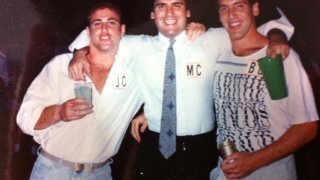
Brian Cuban, billionaire Mark Cuban's younger brother, says people often ask him about his work, especially since his brother is a famous entrepreneur.
But Brian, 59, isn't anything like Mark or their younger brother, Jeff.
"We're different people. My brother [Mark] is driven by different things," Brian tells CNBC Make It.
"I'm never going to be a billionaire and I'm okay with that," Brian says.
Brian is a former Dallas-based personal injury attorney, author and addiction recovery advocate. For the last 13 years, he has been in recovery from alcohol, cocaine and bulimia.
In fact, as Mark Cuban built his massive fortune in the '90s — through sale of his start-ups MicroSolutions and Broadcast.com — and later became the majority stakeholder in the the Dallas Mavericks in 2000, Brian Cuban was more focused on getting high. He remembers during the NBA Finals in 2006, when the Mavericks faced off with the Miami Heat, he was trading championship tickets to his drug dealer.
"For years, my success was a good quality cut of cocaine," Brian tells CNBC Make It.
Money Report
Brian says he's always been different from his brothers.
Growing up in Pittsburgh, Mark, who is three years older, was outgoing and entrepreneurial, while Jeff, who is 13 years younger than Brian, was a nationally ranked wrestler. Brian, on the other hand, was shy, withdrawn, overweight (for which he was bullied) and had a tendency to internalize every negative thought he had, he says. By 16, he was a veteran at drinking.
At Penn State University in the '80s, Brian says he developed an eating disorder due to Body Dysmorphic Disorder, a mental illness that involves obsessing over perceived flaws in appearance.
After he graduated in 1983, Brian went to University of Pittsburgh School of Law, then moved to Dallas in 1986 to practice as a personal injury lawyer and be close to Mark.
Brian says it was in Dallas that he started using cocaine.
"If I'm in a crowd of people in a social situation, it's very difficult for me to function," Cuban told Dallas' CBS 11 News in 2012. Cocaine helped him become a "different person."
Addiction is a common problem among lawyers, and Cuban was able to find financial success, at least for a while. Eventually, however, "feeding the addiction was more important than my clients," Brian says. On multiple occasions he showed up to courtroom hearings under the influence.
But none of Brian's problems had anything to do with Mark or anyone in his family. The problem was, "I had no sense of self. I didn't know who I was. I was ashamed of what I saw in the mirror.
"I never had purpose," Brian says.
After hitting rock bottom in 2007, during which time he says he contemplated suicide, Brian finally got the help he needed. Mark and Jeff took him "kicking and screaming" to a Dallas-based hospital.
"My brothers wanted me to go to [rehab], but I refused to go to treatment," Brian says.
Instead, Brian chose to do a 12-step recovery program on his own. He says his path to recovery started that day, and that's where he has been for the last 13 years. He hasn't relapsed, he says, because he focuses on being mindful and relies heavily on therapy.
"I don't know that you ever really 'complete' the 12-step program. I still attend meetings. Recovery is a life process, at least for me," he says.
In 2017, Brian wrote "The Addicted Lawyer: Tales of The Bar, Booze, Blow, and Redemption." For the last few years, he has worked as a speaker and advocate, traveling the country (these days, virtually), talking about overcoming addiction in an effort to inspire others. He says that last year about 97% of his income was from paid speaking engagements, which are primarily state and local bar and recovery events. (He says he typically doesn't charge law schools or smaller venues.)
Through this work, Brian has found success, because he has found his purpose. "I had to embrace what was important to me versus what was important to [my brothers]," he says.
"My main purpose in life is to share my story with one person and hope that, that story, whatever part of that story they chose, helps them in moving forward in a positive way."
Growing up, the Cuban brothers' father, Norton, would always say that, no matter what they do, whenever they go in life, the most important thing they can do is, "always pick up that phone and tell your brother that you love them," Brian says.
Now, Brian and his wife live down the street from his brothers in Dallas. "We're all very close," he says. (Jeff works with Mark as COO of Mark Cuban Companies Entertainment.)
In a email to Make It, Mark said he is proud of both of his brothers.
"Brian is the most resilient person I know. He has taught me that any of us can bounce back and that love of family makes all of us stronger."
Don't miss: The 6 best credit cards for shopping at Costco






